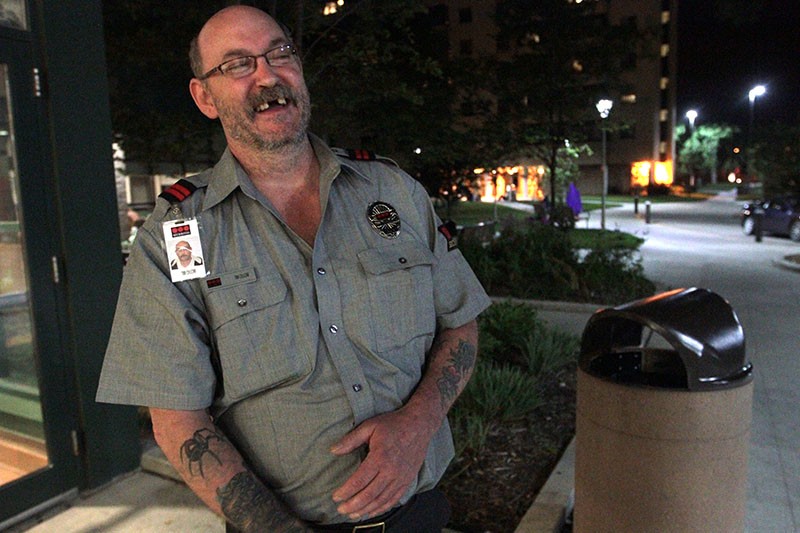Mascud Dahir makes a point not to be in the Cedar-Riverside neighborhood past 10 p.m.
Though many of his closest friends live in the area, the 21-year-old said he doesnâÄôt want to risk becoming the next casualty in the areaâÄôs battle with crime.
âÄúAs youth, weâÄôre supposed to be having fun right now,âÄù he said. âÄúBut every time I come, I hear bad news.âÄù
Dahir is hopeful that things will soon change, and that it will come from youth.
But as the community prepares for a new West Bank safety center to open next month and familiarizes itself with the new Cedar-Riverside Safety Plan, some of the neighborhoodâÄôs youth programming is at stake.
To make room for the safety center, the Confederation of Somali Community in Minnesota is being ousted from its home for the past 17 years, said the director Saeed Fahia.
The change has been a hard road, said Abdirizak Mahboub, the interim executive director for the Riverside Plaza Tenant Association and a student at the Humphrey School of Public Affairs. Every step has been a challenge, he said.
âÄúI donâÄôt feel good about it,âÄù Fahia said. âÄúI think it could have been handled better.âÄù
Fahia said the group had a lease it would renew each year, but when the renewal opportunity should have come this year, it instead received notice that it had to move out in less than three weeks.
CSCM provides youth activities and homework help during the week. Fahia said it will not be able to provide programming this year without the space, which has caused outrage among parents and community volunteers.
âÄúA lot of Somali youth in the community need this programming,âÄù he said. âÄúWe could go to another neighborhood in the city, but we have a special investment in this area.âÄù
An effort to be âÄòwelcomingâÄô
The incoming safety center, part of the Cedar-Riverside Safety Plan, is an agreement between Riverside Plaza owners Sherman Associates and the city of Minneapolis. The plan outlines a $122 million rehabilitation of the Riverside Plaza to improve the quality of life for its 6,000 residents.
When the community was asked about what they wanted out of the rehabilitation, safety topped the list, said Russom Solomon, chairman of the West Bank Community CoalitionâÄôs Safety Committee.
âÄúWe want the neighborhood to be welcoming,âÄù he said. âÄúThere is an issue of perception âÄî people donâÄôt feel safe here.âÄù
Solomon said the center represents a collaboration of many community groups for the common good.
Sherman Associates is donating the space for the new safety center for 10 years as well as an additional $7,500 in funding for programming per year. The Riverside Plaza Tenant Association will also contribute to staff the center.
But Mahboub said nobody is being displaced by the safety center plans.
He said the tenant association has tried to reach out to CSCM âÄî the tenant association has access to about 6,000 square feet of space in the towers âÄî but the CSCM decided to pursue a different course of action.
âÄúWeâÄôre willing to help,âÄù Mahboub said. âÄúWe need to collaborate to have a sit-down so they can tell us what they want to do.âÄù
But Fahia is not enthusiastic about that prospect. Though heâÄôs heard rumors about an offer of space from the buildingâÄôs tenant association, he said hasnâÄôt seen anything in writing yet.
âÄúBecause we are a unique organization, we would like a lease or a space,âÄù Fahia said. âÄúNot just use a community room where we could be kicked out at any time.âÄù
According to Solomon, the political controversy surrounding the space for the new safety center has taken the focus away from its purpose.
âÄúThis is a dominant immigrant population that has yet to be educated about crime,âÄù Solomon said. âÄúPeople here donâÄôt feel comfortable with the police âÄî they feel the police are not on their side.âÄù
âÄúWe are trying to change that,âÄù he added.
Solomon said the center will aim to bridge the gap between the community, police and the city.
Tim Ollom, a security worker in the area, said he is experiencing that challenge first-hand.
âÄúThere have been a couple of nights IâÄôve gone home shaken up,âÄù he said. âÄúBut itâÄôs been an experience. WeâÄôre learning to work together.âÄù
Though he said he has often felt like the âÄútoken white guyâÄù in the area, Ollom is feeling increasingly accepted and relied upon by residents, who even ask him to translate their mail and bring him food during shifts.
Fahia said despite recent conflict, the entire community shares a common purpose. Crime prevention was a major theme of CSCM youth programming.
âÄúI agree with the safety center,âÄù he said. âÄúIt is extremely necessary, but so are we.âÄù
Solomon said the space is meant to serve the entire community, and it will not exclude or displace anybody.
âÄúThe youth have to be part of the safety center,âÄù he said. âÄúThey are part of the safety issue, and have to be part of the solution.âÄù
Dahir said the center is more important to youth than to anybody else.
âÄúThe youth have been a lot of the problem,âÄù he said. âÄúWe need to use these resources so we can stay up all night again.âÄù








